Starting with news of awards, Nick Vivarelli (Variety) reports, " Iraqi-French director Abbas Fahdel’s docu “Homeland (Iraq Year Zero) is the winner of the Doc Alliance Selection Award, given by a group of seven prominent European festivals dedicated to docus, and presented for the first time this year at the Locarno Film Festival."
Here's the trailer for the documentary.
At his website, the following is noted:
Abbas Fahde is an Iraqi-French film director, screenwriter and film critic, born in Babylon, Iraq.
Based in France since the age of 18 years, he studied cinema at the Sorbonne University until Ph.D. In January 2002, he returned to Iraq with a French passport and filmed a documentary film, Back to Babylon (film), in which he asked himself: “What have my childhood friends become? How have their lives changed? What would my life have been like if I hadn’t chosen to build my destiny elsewhere?” The country’s dramatic situation is the background of this introspective investigation.
One year later, in February 2003, when a new war seems imminent, Abbas Fahdel returned to Iraq with the intention of filming his family and friends, and the superstitious hope of protecting them against the dangers threatening them. When the war started, he returned to France and lost all contact with his family. Two months later, he again returned to Iraq and discovered a country shaken by violence, the nightmare of dictatorship replaced by chaos, but a country where, nonetheless, everything remains possible: the best or the worse. This historical moment is the theme of his second documentary film, We Iraqis.
In 2008, he directed the feature film Dawn of the World, a war-drama in which he gives an unexpected account of the multiple impacts of the Gulf Wars and how they have dramatically damaged an area known to be the geographic location of the biblical Garden of Eden.
In 2015, his new film Homeland (Iraq Year Zero), a monumental documentary of 334 minutes, is presented in “World Première” at Visions du réel International Film Festival.
Moving over to activism, protests continue in Iraq. As with last weekend, protests continued. Friday, Alsumaria reported that Shi'ite cleric and movement leader Moqtada al-Sadr issued instructions Thursday for his followers which included that they take part in peaceful actions and not damage private property, that they not wear military uniforms while protesting and that they not carry photos/placards/banners with photos of any political or religious official.
In the image above, the top right is Moqtada al-Sadr and below him is Ammar al-Hakim. Ammar is the leader of the Islamic Supreme Council in Iraq. If he's now supporting the protesters, that would be a big switch from his remarks earlier this week.
From Thursday:
Last weekend saw protests across Iraq. Abdul Latif al-Saadoun (MEM) observes today:
"If we cannot provide enough electric power for the Iraqis, why don't the families buy private generators?" asked an Iraqi official during a recent press interview. It was similar to the quotation misattributed to French Queen Marie Antoinette two hundred years ago; if the people don't have bread, "Then let them eat cake."
Again, like the French, the Iraqis revolted by igniting the uprising in Basra. This spread around the country and this time the Iraqi leaders could not blame the Yazidis, which they had done in the past when there was activity in Iraq's western cities. Those who gathered in Iraq's Tahrir and other Squares did not belong to a specific sect, race or party. They gathered as Iraqis and expressed their anger at their rulers who have subjected them to decades of failure, with neither justice nor anything as mundane as new building projects. Instead, the leaders conspired in the name of religion to loot the country's wealth and used its resources to satisfy their evil desires and feed their obsession for money and power.
al-Saadoun goes on to note how the Iraqi government went on to blame the Islamic State with Ammar al-Hakim (leader of the Islamic Supreme Council of Iraq) insisting that the protesters themselves were members of the Islamic State. How very sad events have been for al-Hakim. His relationship with the US has soured. He's not moved forward or higher in the political hierarchy of Iraq. And now he's attacking the people in a manner that recalls Nouri al-Maliki's ridiculous attacks on the protesters.
So if Ammar is now supporting the protesters, that would actually be major news.
Regardless of whether Ammar supports them or not, the protesters were out in full force:
The protests address corruption and lack of services.
For massive protests, there had to be that and more. The more for many Sunnis include the continued targeting of the Sunni population.
Nothing has changed under Haider's leadership.
He is, thus far, an abject failure.
National Iraqi News Agency reports:
Speaker of the House of Representatives Saleem al-Jubouri announced on Friday that he will be assigned the next session of parliament to discuss the demands of the demonstrators and set time limits for their achievement, stressing the importance of ending the existence of the corrupt who have squandered the money of the Iraqi people.
Al-Jubouri said in a speech addressed to the demonstrators: that the House of Representatives will allocate the next meeting to discuss the demands of the demonstrators and to identify time ceilings for their implementation," adding, that the demonstrators demands are legitimate and can not be ignored, it is necessary to end the presence of the corrupt who have squandered and stole the bounties of the country."
All Iraq News reports:
“All of you together to the court, all of you are thieves,” chanted protesters gathered at Tahrir Square and carrying Iraqi flags. “Friday after Friday, we’ll get the corrupt out.”
Protesters also turned out in Nasiriyah, Diwaniah, Najaf, Samawah, Karbala and Babel provinces to air similar grievances, the reporter of AIN said.
Baghdad and other cities have seen weeks of protests against the poor quality of services, especially power cuts that leave Iraqis with only a few hours of electricity per day as temperatures top 50C.
Last Saturday, Iraq's prime minister dubbed the protests a "warning sign." He faced more warning signs on Friday. All Iraq News reported, "The Supreme Religious Authority said that Prime Minister, Haider al-Abadi, has to avoid the partisan confesionalism and uncover those who hinder reforms." And they noted, "The Supreme Religious Authority called Prime Minister, Haider al-Abadi, to cancel all former and current key officials' privileges." Sputinik added, "Earlier this day, the country’s leading Shiite clergyman Grand Ayatollah Ali al-Sistani released a statement through his aide addressed to Prime Minister Haider al-Abadi, stressing that he should immediately start reforming the government and strike those who steal people’s money with an 'iron fist'."
And Haider's reaction? Reuters quotes him from Facebook writing, "I promise to announce a comprehensive reform plan ... and I call on the political forces to cooperate with me to implement the reform program."
Help me out.
What was happening in February 2011?
Oh, right: Protests.
And what did then-prime minister and forever thug Nouri al-Maliki do?
He declared give him 100 days and he would end corruption, create jobs and blah blah blah.
And so Moqtada called for his followers to leave the streets and stop protesting.
As we noted June 4, 2011:
Among the things Nouri was supposed to be addressing in the 100 Days (called in an attempt to defocus attention on the protests and to buy time for Nouri) was the lack of jobs. Al Mada notes that while the official unemployment rates is 15% (a high number itself), the actual unemployment number is probably 30%. Mohammed Tawfeeq and Chelsea J. Carter (CNN) report on the impending end of the 100 Days and note what's taking place as the end arrives:
But activists and a leading human rights group accused al-Maliki's government of a campaign of intimidation against protest organizers ahead of the deadline, even as an Iraqi government spokesman announced a news conference to showcase improvements.
Hundreds of demonstrators gathered Friday in Baghdad's Tahrir Square to demand the release of four protest organizers -- Jihad Jalil, Ali al-Jaf, Mouyed Faisal and Ahmed Al-Baghdadi -- who were detained during a protest at the same location a week earlier.
Carrying banners that featured pictures of the four organizers, demonstrators chanted: "Oh Maliki, don't muzzle the voice of the people/oh Maliki, release the four immediately."
The 100 Days were also supposed to see an improvement in the security situation. That didn't take place either. Alsumaria TV reports, "Iraqi Parliament Speaker Ousama Al Nujaifi believes that the recurrence of bombings in Iraq without control is a clear sign on the failure to manage security in the country and an indicator on the major downfall in the performance of security forces."
But 100 days came and went and Nouri didn't end a thing. From the June 7, 2011 snapshot:
The 100 Days is over. Al Rafidayn reports Nouri's press conference yesterday in Baghdad found Nouri expressing his hope that "the citizens will treat us kindly in the measuring our accomplishments and that they will be objective." He announced that meetings would take place today on evaluations. New Sabah quotes State Of Law's Khaled al-Asadi stating that Nouri will make assessments through tonight and that the 100 Days was in order to evaluate the performances and that "no sane person would assume a government only four years old could accomplish improvement in one hundred days." Oh, how they try to lower the expectations now. The 100 Days? Al Jazeera gets it right, "Maliki gave his cabinet a 100-day deadline to improve basic services after a string of anti-government protests across Iraq in February. He promised to assess their progress at the end of that period, and warned that 'changes will be made' at failing ministries. That deadline expired on Tuesday -- and Maliki largely retreated from his threat, instead asking for patience and more time to solve problems." Fakhri Karim (Al Mada) observes that the 100 Days has done little to instill strength in the belief that Nouri has the "ability to manage the Cabinet" and the duties of the office of prime minister. Karim notes that Nouri's inability to govern, his failure at it, led to the protests and that they were for the basic services which are "the most basic necessities" of our time.
Iraqi politicians are known for playing kick-the-can and insisting, given time, they will solve something while apparently all they're hoping for is that, in the delay, people will forget. Even Nouri appears to hope that the protesters have forgotten 2011. Mustafa Salim and Liz Sly (Washington Post) reports:
The protesters included a sizable number of supporters of former prime minister Nouri al-Maliki, who suppressed similar demonstrations against the corruption of his government four years ago by detaining and intimidating organizers. Maliki, who has not attempted to hide his hope of returning to power, issued a statement calling on Abadi “to hit corrupt officials financially and politically.”
Many demonstrators said they had turned out only to demand what Lamia Fadhil, 29, called “a decent life.”
“For more than 10 years the government didn’t provide anything for us. No electricity, no services and no jobs,” she said. “That’s it. We’ve had enough.”
Reuters reports:
In Basra on Friday, one sign depicted the city as a bony "milking cow" -- a reference to complaints that Baghdad has benefited from the region's oil while neglecting basic services like power and water.
"I call for fighting any corrupt official," said government employee Muntadhar Hatam, 55. "They are more dangerous than Daesh (Islamic State). They are the terrorists."
The same charges were made against Nouri al-Maliki.
Is that any real surprise?
Nouri al-Maliki is head of the Dawa political party.
Haider al-Abadi is in the Dawa political party.
Ahead of the 2010 elections, Nouri refused to run with Dawa and created the political coalition State of Law.
Haider al-Abadi is a member of the State of Law coalition.
There were any number of Shi'ite politicians US President Barack Obama could have backed for prime minister this time last year.
He could have gone with, for example, anyone from the National Alliance or ISCI. He could have backed Moqtada (though he never would, the US government has spent 12 years demonizing Moqtada).
Instead, for 'change,' he backed someone who was friends with Nouri, who served in Nouri's political coalition and was a member of the same political party.
And then Barack wanted to pretend 'change' was possible in Iraq.
Nouri pulled the country to the edge of destruction.
For those not paying attention, the Iraqi people kicked him out in the 2010 elections but Barack used a contract (The Erbil Agreement) to give Nouri a second term as prime minister. That agreement was supposed to ensure a power-sharing government and Barack personally called Ayad Allawi (whose Iraqiya won the election) to insist that the contract had the full backing of the White House.
But Nouri refused to implement the power-sharing government.
So Iraqi leaders began demanding he do so in the summer of 2011 -- Ayad Allawi, Moqtada al-Sadr, Osama al-Nujaifi, Massoud Barzani and more -- Shi'ites, Sunnis, Kurds, all demanding Nouri honor the contract.
He refused to do so.
So, in the spring of 2012, they moved towards a no-confidence vote in Parliament to strip Nouri of his office.
Moqtada repeatedly stated publicly that the effort could be killed at any time by Nouri agreeing to implement the power-sharing government he promised in The Erbil Agreement (promised in order to get a second term after losing the 2010 election).
They gathered the signatures, as the Constitution demanded. They then handed them over to the president of Iraq, Jalal Talabani.
Talabani refused to obey the Constitution and forward the petition to Parliament.
He instead announced he had checked the signatures and some of the MPs -- he never identified them -- said they wouldn't sign the petition if it was put before them today.
Too damn bad.
Not only was this not Jalal's role but there's also the fact that you make your decision when you sign. You don't get to remove your name after you signed (and maybe they wanted to or maybe Jalal just lied).
If they wanted to change their mind, they could do so during the actual vote.
But, under pressure from the White House, Jalal pretended he had the right to kill the petition and that's what he did.
Then like the grotesque fat ass coward that he is, he announced he was leaving for Germany because he needed to have surgery -- it was surgery necessary for his continued living.
Turns out he was having knee surgery.
Karma bit the liar in the ass and months later he'd have a stroke.
But after he killed the petition, the Iraqi people took to the streets.
They had tried to vote Nouri out.
They had tried to have their elected officials remove him.
All they had left was protests.
And Nouri called them terrorists, had reporters covering the protests kidnapped by the police, tortured by the police and he had the protesters followed home, had them arrested, had them killed -- yes, had them killed (especially in Anbar Province) and then he began attacking them at peaceful protests.
The Iraqi people could not take a third term of Nouri -- Nouri who'd promised in 2011 that he would not seek a third term.
The point of forcing Nouri out, as Barack did, was to calm the crises in Iraq.
The point was to provide a re-set.
And the new prime minister -- whomever he or she was -- would work quickly to demonstrate a difference with Nouri, to end the persecution, to end the corruption, to provide public services, to end the illegal detention of Sunnis, the beatings and rapes of Sunni women falsely arrested, and so much more.
He couldn't even stop the illegal bombings of residential neighborhoods in Falluja.
September 13, 2014, he noted these bombings were wrong (they are illegal, they meet the legal definition of War Crimes).
He said they had ended. He had ordered their end.
September 14th, the very next day, they continued and have ever since.
Haider's provided no change and the Iraqi people are registering that after a year.
The violence continues (even increases) under Haider. Margaret Griffis (Antiwar.com) counts 109 violent deaths across Iraq on Friday.
We spent the bulk of the July 18th snapshot noting the failure that is Barack's plan or 'plan' with regards to combating the Islamic State in Iraq. Today, Trevor Timm (Guardian) observes the failures:
This Saturday marks one full year since the US military began its still-undeclared war against Islamic State that the government officials openly acknowledge will last indefinitely. What do we have to show for it? So far, billions of dollars have been spent, thousands of bombs have been dropped, hundreds of civilians have been killed and Isis is no weaker than it was last August, when the airstrikes began.
But don’t take it from me – that’s the conclusion of the US intelligence community itself. As the Associated Press reported a few days ago, the consensus view of the US intelligence agencies is that Isis is just as powerful as it was a year ago, and they can replace fighters faster than they are getting killed.
iraq
aswat al-raq
al mada
david ali
cnn
mohammed tawfeeq
chelsea j. carter
dar addustour
al jazeera
The protests address corruption and lack of services.
For massive protests, there had to be that and more. The more for many Sunnis include the continued targeting of the Sunni population.
Nothing has changed under Haider's leadership.
He is, thus far, an abject failure.
National Iraqi News Agency reports:
Speaker of the House of Representatives Saleem al-Jubouri announced on Friday that he will be assigned the next session of parliament to discuss the demands of the demonstrators and set time limits for their achievement, stressing the importance of ending the existence of the corrupt who have squandered the money of the Iraqi people.
Al-Jubouri said in a speech addressed to the demonstrators: that the House of Representatives will allocate the next meeting to discuss the demands of the demonstrators and to identify time ceilings for their implementation," adding, that the demonstrators demands are legitimate and can not be ignored, it is necessary to end the presence of the corrupt who have squandered and stole the bounties of the country."
All Iraq News reports:
“All of you together to the court, all of you are thieves,” chanted protesters gathered at Tahrir Square and carrying Iraqi flags. “Friday after Friday, we’ll get the corrupt out.”
Protesters also turned out in Nasiriyah, Diwaniah, Najaf, Samawah, Karbala and Babel provinces to air similar grievances, the reporter of AIN said.
Baghdad and other cities have seen weeks of protests against the poor quality of services, especially power cuts that leave Iraqis with only a few hours of electricity per day as temperatures top 50C.
Last Saturday, Iraq's prime minister dubbed the protests a "warning sign." He faced more warning signs on Friday. All Iraq News reported, "The Supreme Religious Authority said that Prime Minister, Haider al-Abadi, has to avoid the partisan confesionalism and uncover those who hinder reforms." And they noted, "The Supreme Religious Authority called Prime Minister, Haider al-Abadi, to cancel all former and current key officials' privileges." Sputinik added, "Earlier this day, the country’s leading Shiite clergyman Grand Ayatollah Ali al-Sistani released a statement through his aide addressed to Prime Minister Haider al-Abadi, stressing that he should immediately start reforming the government and strike those who steal people’s money with an 'iron fist'."
And Haider's reaction? Reuters quotes him from Facebook writing, "I promise to announce a comprehensive reform plan ... and I call on the political forces to cooperate with me to implement the reform program."
Help me out.
What was happening in February 2011?
Oh, right: Protests.
And what did then-prime minister and forever thug Nouri al-Maliki do?
He declared give him 100 days and he would end corruption, create jobs and blah blah blah.
And so Moqtada called for his followers to leave the streets and stop protesting.
As we noted June 4, 2011:
Among the things Nouri was supposed to be addressing in the 100 Days (called in an attempt to defocus attention on the protests and to buy time for Nouri) was the lack of jobs. Al Mada notes that while the official unemployment rates is 15% (a high number itself), the actual unemployment number is probably 30%. Mohammed Tawfeeq and Chelsea J. Carter (CNN) report on the impending end of the 100 Days and note what's taking place as the end arrives:
But activists and a leading human rights group accused al-Maliki's government of a campaign of intimidation against protest organizers ahead of the deadline, even as an Iraqi government spokesman announced a news conference to showcase improvements.
Hundreds of demonstrators gathered Friday in Baghdad's Tahrir Square to demand the release of four protest organizers -- Jihad Jalil, Ali al-Jaf, Mouyed Faisal and Ahmed Al-Baghdadi -- who were detained during a protest at the same location a week earlier.
Carrying banners that featured pictures of the four organizers, demonstrators chanted: "Oh Maliki, don't muzzle the voice of the people/oh Maliki, release the four immediately."
The 100 Days were also supposed to see an improvement in the security situation. That didn't take place either. Alsumaria TV reports, "Iraqi Parliament Speaker Ousama Al Nujaifi believes that the recurrence of bombings in Iraq without control is a clear sign on the failure to manage security in the country and an indicator on the major downfall in the performance of security forces."
But 100 days came and went and Nouri didn't end a thing. From the June 7, 2011 snapshot:
The 100 Days is over. Al Rafidayn reports Nouri's press conference yesterday in Baghdad found Nouri expressing his hope that "the citizens will treat us kindly in the measuring our accomplishments and that they will be objective." He announced that meetings would take place today on evaluations. New Sabah quotes State Of Law's Khaled al-Asadi stating that Nouri will make assessments through tonight and that the 100 Days was in order to evaluate the performances and that "no sane person would assume a government only four years old could accomplish improvement in one hundred days." Oh, how they try to lower the expectations now. The 100 Days? Al Jazeera gets it right, "Maliki gave his cabinet a 100-day deadline to improve basic services after a string of anti-government protests across Iraq in February. He promised to assess their progress at the end of that period, and warned that 'changes will be made' at failing ministries. That deadline expired on Tuesday -- and Maliki largely retreated from his threat, instead asking for patience and more time to solve problems." Fakhri Karim (Al Mada) observes that the 100 Days has done little to instill strength in the belief that Nouri has the "ability to manage the Cabinet" and the duties of the office of prime minister. Karim notes that Nouri's inability to govern, his failure at it, led to the protests and that they were for the basic services which are "the most basic necessities" of our time.
Iraqi politicians are known for playing kick-the-can and insisting, given time, they will solve something while apparently all they're hoping for is that, in the delay, people will forget. Even Nouri appears to hope that the protesters have forgotten 2011. Mustafa Salim and Liz Sly (Washington Post) reports:
The protesters included a sizable number of supporters of former prime minister Nouri al-Maliki, who suppressed similar demonstrations against the corruption of his government four years ago by detaining and intimidating organizers. Maliki, who has not attempted to hide his hope of returning to power, issued a statement calling on Abadi “to hit corrupt officials financially and politically.”
Many demonstrators said they had turned out only to demand what Lamia Fadhil, 29, called “a decent life.”
“For more than 10 years the government didn’t provide anything for us. No electricity, no services and no jobs,” she said. “That’s it. We’ve had enough.”
Reuters reports:
In Basra on Friday, one sign depicted the city as a bony "milking cow" -- a reference to complaints that Baghdad has benefited from the region's oil while neglecting basic services like power and water.
"I call for fighting any corrupt official," said government employee Muntadhar Hatam, 55. "They are more dangerous than Daesh (Islamic State). They are the terrorists."
The same charges were made against Nouri al-Maliki.
Is that any real surprise?
Nouri al-Maliki is head of the Dawa political party.
Haider al-Abadi is in the Dawa political party.
Ahead of the 2010 elections, Nouri refused to run with Dawa and created the political coalition State of Law.
Haider al-Abadi is a member of the State of Law coalition.
There were any number of Shi'ite politicians US President Barack Obama could have backed for prime minister this time last year.
He could have gone with, for example, anyone from the National Alliance or ISCI. He could have backed Moqtada (though he never would, the US government has spent 12 years demonizing Moqtada).
Instead, for 'change,' he backed someone who was friends with Nouri, who served in Nouri's political coalition and was a member of the same political party.
And then Barack wanted to pretend 'change' was possible in Iraq.
Nouri pulled the country to the edge of destruction.
For those not paying attention, the Iraqi people kicked him out in the 2010 elections but Barack used a contract (The Erbil Agreement) to give Nouri a second term as prime minister. That agreement was supposed to ensure a power-sharing government and Barack personally called Ayad Allawi (whose Iraqiya won the election) to insist that the contract had the full backing of the White House.
But Nouri refused to implement the power-sharing government.
So Iraqi leaders began demanding he do so in the summer of 2011 -- Ayad Allawi, Moqtada al-Sadr, Osama al-Nujaifi, Massoud Barzani and more -- Shi'ites, Sunnis, Kurds, all demanding Nouri honor the contract.
He refused to do so.
So, in the spring of 2012, they moved towards a no-confidence vote in Parliament to strip Nouri of his office.
Moqtada repeatedly stated publicly that the effort could be killed at any time by Nouri agreeing to implement the power-sharing government he promised in The Erbil Agreement (promised in order to get a second term after losing the 2010 election).
They gathered the signatures, as the Constitution demanded. They then handed them over to the president of Iraq, Jalal Talabani.
Talabani refused to obey the Constitution and forward the petition to Parliament.
He instead announced he had checked the signatures and some of the MPs -- he never identified them -- said they wouldn't sign the petition if it was put before them today.
Too damn bad.
Not only was this not Jalal's role but there's also the fact that you make your decision when you sign. You don't get to remove your name after you signed (and maybe they wanted to or maybe Jalal just lied).
If they wanted to change their mind, they could do so during the actual vote.
But, under pressure from the White House, Jalal pretended he had the right to kill the petition and that's what he did.
Then like the grotesque fat ass coward that he is, he announced he was leaving for Germany because he needed to have surgery -- it was surgery necessary for his continued living.
Turns out he was having knee surgery.
Karma bit the liar in the ass and months later he'd have a stroke.
But after he killed the petition, the Iraqi people took to the streets.
They had tried to vote Nouri out.
They had tried to have their elected officials remove him.
All they had left was protests.
And Nouri called them terrorists, had reporters covering the protests kidnapped by the police, tortured by the police and he had the protesters followed home, had them arrested, had them killed -- yes, had them killed (especially in Anbar Province) and then he began attacking them at peaceful protests.
The Iraqi people could not take a third term of Nouri -- Nouri who'd promised in 2011 that he would not seek a third term.
The point of forcing Nouri out, as Barack did, was to calm the crises in Iraq.
The point was to provide a re-set.
And the new prime minister -- whomever he or she was -- would work quickly to demonstrate a difference with Nouri, to end the persecution, to end the corruption, to provide public services, to end the illegal detention of Sunnis, the beatings and rapes of Sunni women falsely arrested, and so much more.
He couldn't even stop the illegal bombings of residential neighborhoods in Falluja.
September 13, 2014, he noted these bombings were wrong (they are illegal, they meet the legal definition of War Crimes).
He said they had ended. He had ordered their end.
September 14th, the very next day, they continued and have ever since.
Haider's provided no change and the Iraqi people are registering that after a year.
The violence continues (even increases) under Haider. Margaret Griffis (Antiwar.com) counts 109 violent deaths across Iraq on Friday.
We spent the bulk of the July 18th snapshot noting the failure that is Barack's plan or 'plan' with regards to combating the Islamic State in Iraq. Today, Trevor Timm (Guardian) observes the failures:
This Saturday marks one full year since the US military began its still-undeclared war against Islamic State that the government officials openly acknowledge will last indefinitely. What do we have to show for it? So far, billions of dollars have been spent, thousands of bombs have been dropped, hundreds of civilians have been killed and Isis is no weaker than it was last August, when the airstrikes began.
But don’t take it from me – that’s the conclusion of the US intelligence community itself. As the Associated Press reported a few days ago, the consensus view of the US intelligence agencies is that Isis is just as powerful as it was a year ago, and they can replace fighters faster than they are getting killed.
iraq
aswat al-raq
al mada
david ali
cnn
mohammed tawfeeq
chelsea j. carter
dar addustour
al jazeera
 Hayder al-Khoei
Hayder al-Khoei

 Methaq Al -fayydh
Methaq Al -fayydh


 Ammar karim
Ammar karim
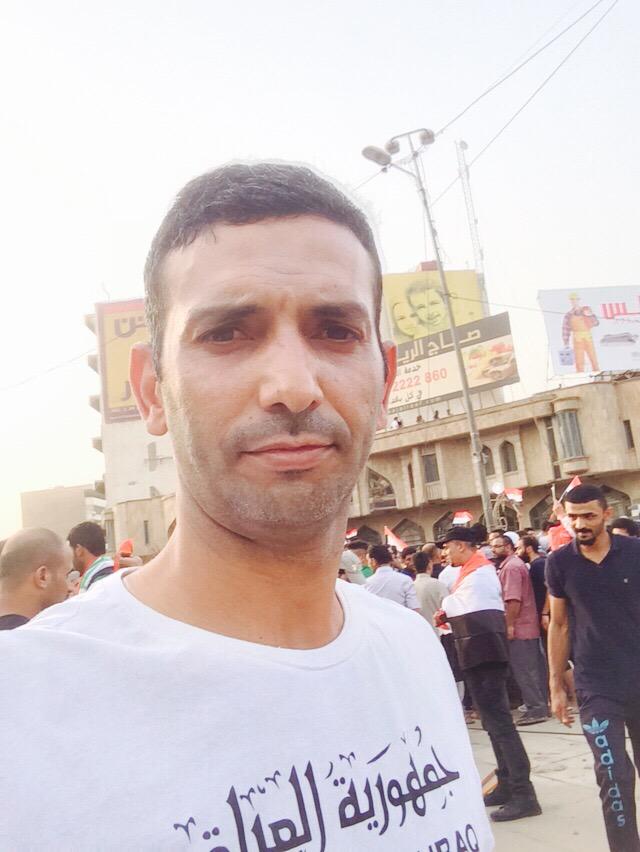
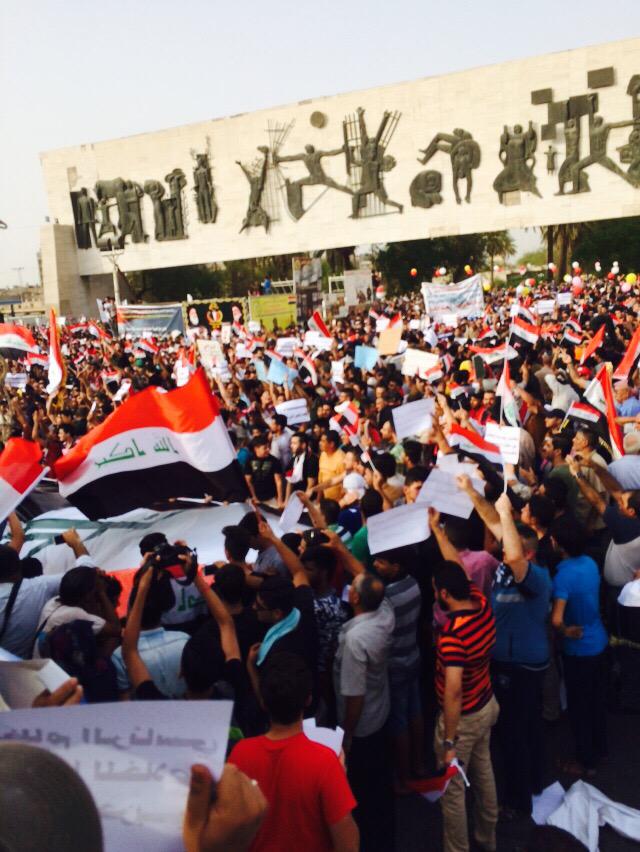
 Nader Uskowi
Nader Uskowi
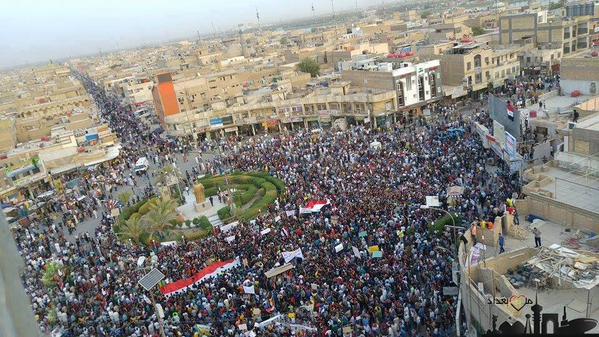
 #IRAQ شمرية العراق
#IRAQ شمرية العراق




 LEWIS
LEWIS




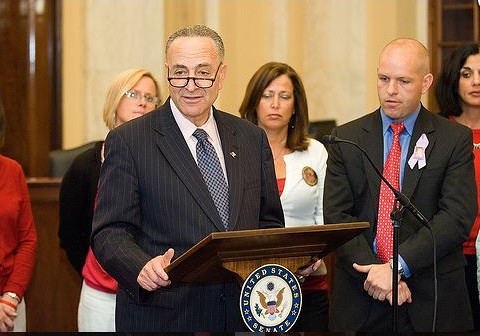
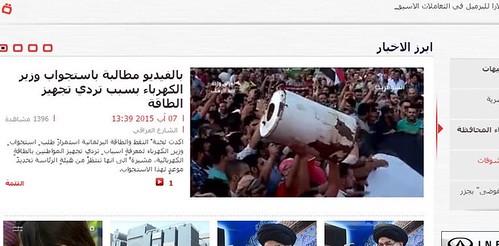
 اعلام الربيع العراقي
اعلام الربيع العراقي